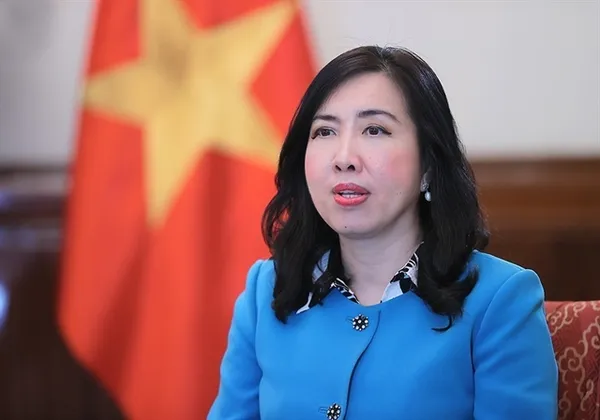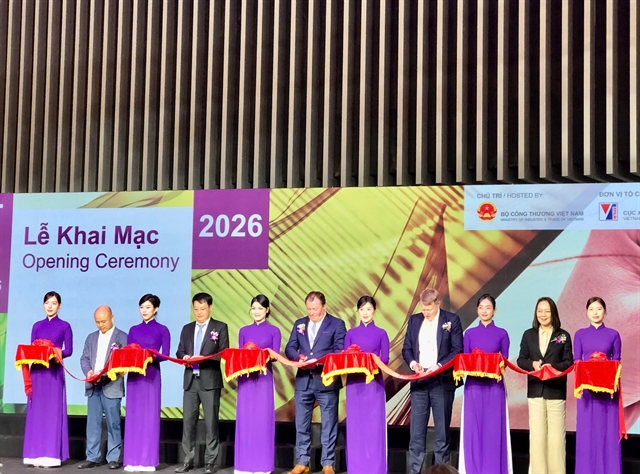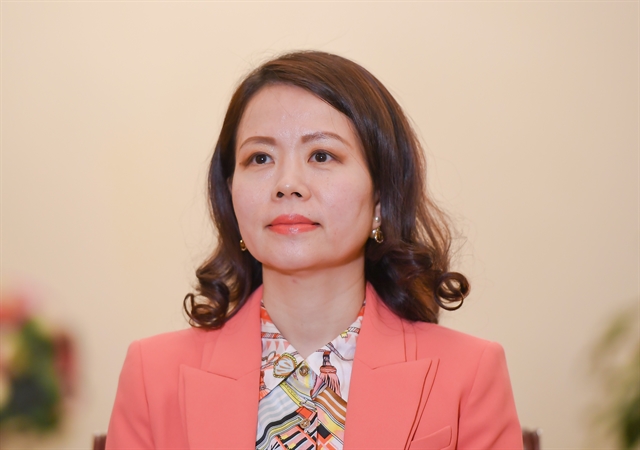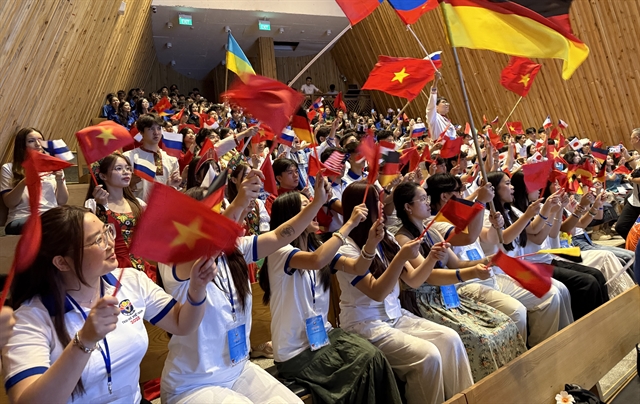 Opinion
Opinion

 |
| Deputy Foreign Minister Nguyễn Minh Hằng. VNA/VNS Photos |
Nhân Dân (People) newspaper recently spoke with Deputy Foreign Minister Nguyễn Minh Hằng about technology diplomacy, highlighting its role as a pioneering spearhead and central focus of economic diplomacy in the new era. As Việt Nam navigates a rapidly changing global landscape, technology diplomacy is emerging as a crucial tool for expanding international partnerships and boosting economic growth.
With the aspiration to become a technology nation on par with major powers, Việt Nam has implemented numerous models and connected with many countries to realise its ambition of becoming an indispensable part of the global technology arena. How do you assess the role of science and technology diplomacy in the context of Việt Nam accelerating digital transformation and deep international integration?
In this new era of national development, science and technology diplomacy plays an extremely important role.
Diplomacy must take the lead, open pathways, connect and create, contributing to the realisation of Việt Nam’s aspiration to become a developed technology nation with an established position on the international stage.
First, to create a favourable international environment for Việt Nam’s technological breakthrough, diplomacy must pave the way, positioning science and technology, innovation and digital transformation as new pillars in relations with partners, particularly strategic and comprehensive partners with strengths and potential in science and technology.
In just the first eight months of 2025, nearly 40 technology cooperation agreements were signed, opening new legal corridors, resources and spaces for development.
What should be emphasised is that these agreements are being implemented resolutely by ministries, sectors, localities and enterprises while the government has set up mechanisms for review, supervision and direction to ensure effective and substantive implementation, in line with the prime minister’s directive that 'words must be matched by deeds and commitments must be honoured.'
The second point concerns attracting intellectual resources and high-quality capital for national digital transformation. Science and technology diplomacy connects the global Vietnamese intellectual community, attracts international experts and mobilises green financial resources and advanced technologies to directly serve the country’s key projects.
Each cooperation agreement and every international meeting is not just a document but a gateway into the world’s innovation ecosystem.
The third point is to affirm Việt Nam’s position and voice in shaping the global “rules of the game” in science, technology and digital transformation.
By engaging in the United Nations, ASEAN, APEC, the World Intellectual Property Organization, the International Telecommunication Union and other forums, Việt Nam not only learns but also actively contributes, proposes initiatives and participates proactively in building international norms for strategic technologies.
This is the pathway for Việt Nam to become a 'co-creator of the rules' rather than a mere follower.
In summary, science and technology diplomacy is being vigorously advanced, contributing to creating new development drivers, ensuring economic security, strengthening strategic and technological autonomy, maximising opportunities and external resources and deepening international integration to turn technology and digital transformation into fresh engines of national development.
On December 22, 2024, the Politburo issued Resolution No. 57-NQ/TW on breakthroughs in the development of science and technology, innovation and national digital transformation. The Prime Minister has also directed strong promotion of science and technology diplomacy. Could you share how the Ministry of Foreign Affairs is concretising the substance of science and technology diplomacy?
In the smart era, science and technology has become the main driver for national development breakthroughs.
We have identified that if economic diplomacy is the central task, then technology diplomacy must be the pioneering spearhead and the central task of economic diplomacy in the new era.
Thoroughly grasping Resolution No. 57-NQ/TW of the Politburo and decisively implementing the directives of the Party, State, Government and Prime Minister, the Ministry of Foreign Affairs has recently coordinated with the Ministry of Science and Technology and relevant ministries and agencies to concretise the substance of science and technology diplomacy, with the guiding principle of 'strategic thinking, concrete action, substantive results.'
The key tasks have been comprehensively and synchronously implemented along five main dimensions:
First, creating and consolidating strategic cooperation frameworks while deepening the content of cooperation in science, technology and innovation with partners, especially major partners in these fields. Science, technology, innovation and digital transformation have become priority focuses in nearly 60 high-level external activities since the beginning of the year.
Second, regularly coordinating with ministries and sectors to review and promote the implementation of signed cooperation agreements, especially with strategic partners in science and technology.
Third, supporting the connection of localities, enterprises and domestic universities with international partners, mobilising international resources for the development of high technology and high-quality human resources.
Active efforts have been made to connect with and encourage leading global technology corporations to commit to expanding investment, cooperating in building semiconductor and AI ecosystems, and transferring technology to Việt Nam.
Many specific projects have been implemented, such as the project to enhance the capacity of the National Innovation Centre with VNĐ51 billion assistance from Japan.
Fourth, connecting Vietnamese intellectuals with the world, expanding networks and attracting overseas Vietnamese experts and intellectuals.
The Ministry of Foreign Affairs has successfully organised large-scale events attracting overseas Vietnamese experts, such as the 2025 Conference of Vietnamese Scientists and Intellectuals, the National Conference on Breakthroughs in Science and Technology Development chaired by Party General Secretary Tô Lâm and the Conference on Mobilising Overseas Resources to Promote Việt Nam–EU Relations.
It has consolidated more than 30 associations of intellectuals in key regions and established a network of over 80 high-tech experts, laying the foundation for the Global Vietnamese Talent Network.
Fifth, strengthening research and strategic advisory work for the Party, State and Government, promptly identifying new trends such as AI, the digital economy, rare earth industries and data governance, so that 'we are not behind, but keep pace, and strive to move ahead in certain areas.'
Currently, the Ministry of Foreign Affairs is leading coordination with the Ministry of Science and Technology and other relevant ministries and agencies to develop systematic, focused and prioritised plans and strategies to promote international cooperation in strategic technologies, semiconductors, AI and high-quality human resource training.
Along with achievements come challenges. What are the main obstacles?
Every path has challenges. We have clearly identified three major current challenges.
First is the complex geopolitical context. The trend of politicising and securitising economic cooperation, coupled with increasing fragmentation and division, is becoming more apparent, especially in the field of high technology.
This creates significant barriers and pressures, making access to core and foundational technologies increasingly difficult.
Second is the global race for talent. Việt Nam is in fierce competition with many other countries to attract and retain outstanding experts and scientists, particularly Vietnamese intellectuals abroad.
A global survey by PwC in February 2025 showed that 66 per cent of business leaders would not hire candidates lacking AI skills.
Countries are rolling out red-carpet policies to attract 'brains.' For Việt Nam, this raises the urgent question of not only how to retain domestic talent but also how to attract the world’s brightest minds and the talented Vietnamese diaspora.
Third are the bottlenecks in institutions and implementation capacity. Recently, Vietnam has made significant efforts to remove institutional barriers, promoting development and international cooperation in science, technology, and innovation.
The Politburo’s Resolution 57-NQ/TW on the development of science, technology, innovation and digital transformation has been a breakthrough.
However, to fully capitalise on opportunities from international cooperation, Việt Nam needs to continue more intensive reforms to remove institutional barriers, turning institutions into a true competitive advantage in science and technology development while also paying greater attention to implementation capacity at all levels.
What are the Ministry of Foreign Affairs’ breakthrough orientations to foster science and technology diplomacy?
With the spirit of 'turning challenges into opportunities,' the Ministry of Foreign Affairs will continue to accompany ministries, sectors, localities, enterprises and research institutions to vigorously implement science and technology diplomacy along seven key directions.
First, strengthening the substance of cooperation on science, technology and innovation (STI) in external relations, especially at the high level. We will promote the establishment of new partnership frameworks on STI, making STI a central pillar in partnerships, including with major economies, emerging economies and leading technology corporations.
We will also focus on strategic technologies such as biotechnology, new energy, advanced materials, quantum technology, robotics and automation.
Secondly, effectively implementing signed cooperation agreements with strategic partners, such as the United States, China, Japan, South Korea, Singapore, and some EU countries, with an emphasis on research and development, technology transfer, training, and human resource development, particularly in high technology, core sciences, and foundational technologies.
Thirdly, mobilising international resources and green finance associated with technology transfer. We plan to attract investment into flagship, pioneering projects linked to technology transfer, workforce training and greater participation of Vietnamese enterprises in global value chains.
Fourthly, fully implementing Resolution 57-NQ/TW on breakthroughs in STI and digital transformation, and Resolution 68-NQ/TW on private sector development. We will maintain regular channels of communication with domestic enterprises to promptly understand their needs and provide swift support for digital transformation, in line with Party General Secretary Tô Lâm’s directive to 'protect, encourage and promote' the private economy.
Fifth, advancing talent diplomacy by engaging global Vietnamese intellectuals, attracting international experts to teach, research and transfer technology. The ministry is set to build a 'Global Vietnamese Talent Network' to connect international experts, including 'chief architects' capable of leading Việt Nam’s major technology projects.
Sixth, proactively proposing and promoting cooperation initiatives and participating in shaping new frameworks of international rules on STI at multilateral forums such as the United Nations, ASEAN, APEC, UNESCO, P4G and Mekong cooperation mechanisms.
Last but not least, training a highly skilled team of technology diplomats. Each Vietnamese overseas mission will become a 'science, technology and innovation bridge' in its host country.
The development of science and technology is a long and complex journey that requires the decisive involvement of the entire political system and the people.
The diplomatic sector is committed to playing a pioneering role as a solid, effective bridge, transforming global knowledge and resources into endogenous strength, promoting Việt Nam’s scientific and technological development, enhancing national competitiveness and elevating the country’s position internationally toward realising the two centenary goals and the aspiration for a strong and prosperous country.
Overseas Vietnamese community has a number of intellectuals, experts and scientists working at global technological centres. How has the ministry done to connect, attract and take advantage of this resource for the national development goal and sci-tech breakthroughs?
 |
| Việt Nam Summer Camp 2025 was held in Đắk Lắk Province in July, attended by 110 overseas Vietnamese youths and students from 31 countries and territories, including Germany, Canada, Cambodia, Thailand, the United States, Hungary and the Czech Republic. |
Overseas Vietnamese intellectuals are a valuable source of knowledge, always ready to accompany and contribute to the country’s advancement.
Their advantage lies in their high professional qualifications and extensive international experience, mainly in two groups: Vietnamese intellectuals trained domestically who later study and work abroad at leading science and technology centres; and younger generations of overseas Vietnamese intellectuals born and raised abroad, educated in advanced systems.
They hold high prestige in host countries, with many serving as professors, research team leaders or chief engineers in major technology firms.
In recent years, the Ministry of Foreign Affairs has introduced policies and measures to maximise the intellectual contributions of global Vietnamese to national development.
These include organising global forums and conferences to connect overseas intellectuals and coordinating with relevant ministries to advise on improving legal frameworks and preferential policies to attract overseas Vietnamese experts.
A notable step has been the revised Nationality Law, easing conditions for acquiring or resuming Vietnamese nationality while retaining foreign citizenship, addressing the legitimate aspirations of overseas Vietnamese.
In the time ahead, the Ministry of Foreign Affairs will continue to work closely with relevant ministries to better mobilise overseas Vietnamese intellectual resources through three key measures.
First, improving the legal framework on mechanisms and policies to attract and leverage the expertise of overseas Vietnamese intellectuals.
Despite progress, administrative procedures such as recognition of academic titles, patent registration, intellectual property protection and setting up research facilities remain cumbersome.
Limitations persist in working environments, recruitment and incentive policies.
The ministry will coordinate with the Ministry of Science and Technology, the Ministry of Home Affairs, the Ministry of Education and Training, the Ministry of Justice and other agencies to finalise plans and preferential mechanisms on salaries, housing and rewards to encourage outstanding overseas Vietnamese experts and scientists to return and take leadership positions in public institutions and major scientific projects.
Second, strengthening information sharing with the overseas Vietnamese community. Many overseas intellectuals still lack updated information on Việt Nam’s recent legal reforms, leading to perception gaps and doubts about domestic transparency and stability.
The ministry will work with relevant agencies to remove these barriers and enhance outreach through forums, conferences and official channels of Vietnamese representative missions and the State Committee for Overseas Vietnamese Affairs, building better trust.
Third, establishing mechanisms to assign concrete tasks to overseas Vietnamese intellectuals. Many have emphasised the need for specific 'assignments' or problems from domestic institutions, as well as clear mechanisms for receiving, processing and responding to their contributions.
They also stress that contributions do not always require returning home but can be made remotely through knowledge transfer, experience sharing or connecting with foreign experts — provided that specific tasks are clearly defined.
The ministry will therefore coordinate with relevant agencies to develop such assignments and communicate them through overseas representative missions and associations, enabling overseas Vietnamese experts to contribute according to their expertise and conditions. — VNS




